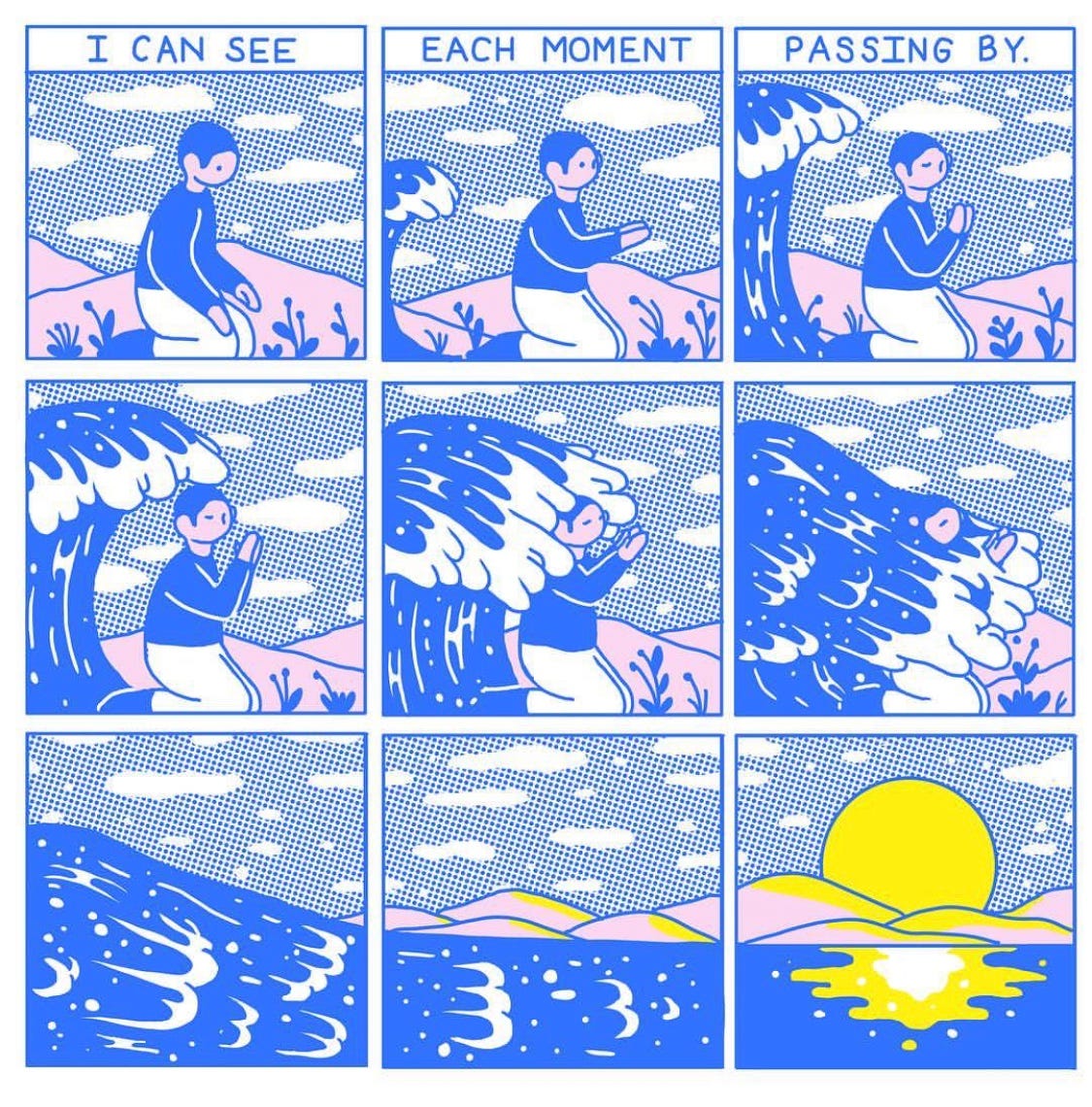Why is this interesting? - The Good Place Edition
On moral philosophy, comedy, and how amazing it is that a TV show combining the two actually got made
Amber Finlay (AF from here on out) and I met back in the days when email newsletters were blogs and every planner in marketing had one. Her superpower is an ability to find throughlines between technology, culture, art, and fashion that no one else sees. We gave her carte blanche over today’s email and it’s a pretty good summation of her brain: TV, philosophy, existentialist comics, 90’s movies, celebrity stylists, and the narrative arts. Enjoy! - Noah (NRB)
Amber here. I just saw that one of my favorite shows, “The Good Place”, has been renewed for a fourth season. If you haven’t watched it, the basic premise is that a self-absorbed woman dies, and find herself mistakenly in The Good Place: a non-denominational heaven situation. To avoid being discovered and sent to “The Bad Place”, she takes ethics lessons from a moral philosophy professor who is there with her. It’s 1000 times better than my description, but I won’t* spoil it for you. *Well - I’ll call it out if I’m linking to an article that contains any spoilers.
Why is this interesting?
It’s 2019, and the fact that a show centered heavily around moral philosophy and ethical theory exists on network television is fairly astounding. I don’t just mean that it contains dialogue about right and wrong. The show dives deep into the works of various moral philosophers, basically turning each episode into a classroom where you contemplate fairly heady philosophical problems alongside the characters.
This excerpt from a NYT Magazine piece sums up my general feeling of amazement that NBC agreed to make this thing:
The premise of “The Good Place” is absurdly high concept. It sounds less like the basis of a prime-time sitcom than an experimental puppet show conducted, without a permit, on the woodsy edge of a large public park...Ethics is not some kind of moralistic byproduct; it’s baked into the very premise. The show is entirely life lessons. Every episode is Very Special. It synthesizes those old contradictory impulses — jester vs. guru — so completely that they cease to be in tension. If “Seinfeld” was a show about nothing, “The Good Place” is a show about everything — including, and especially, growing and learning. By all rights, it should probably be awful — preachy, awkward, tedious, wooden, labored and out of touch. Instead, it is excellent: a work of popular art that hits on many levels at once. It has been not only critically acclaimed but also widely watched, especially on streaming services, where its twists and intricate jokes lend themselves to bingeing and rebingeing. The modern world, perhaps, is hungrier for ethics than we have been led to believe.
In these end times of abrupt cancel culture, the notion that a sitcom-like object can make us think about weighing the consequences of our actions, and about what we owe to each other, feels hopeful and reassuring. (Also it’s hilarious. A recurring joke is the restaurant names -- Cruller Intentions, The Fertile Croissant, Eclair and Present Danger -- usually delivered by writer Megan Amram.)
Michael Schur, the show’s creator, had basically built such an impeccable track record on The Office and Parks and Rec that NBC gave him “a skip the line” pass to create any show he wanted. The level of research (spoiler link!) he did before pitching it was extensive, including sourcing two PHD philosophers (I’m not sure they call themselves that actually), Todd May and Pamela Hieronymi, who act as academic advisors to the writing staff.
This isn’t uncommon in Hollywood, but the “expert technical advisor” realm for TV is usually populated by people like blood spatter analysts and snipers. If the CSI Effect made us all forensics experts, maybe the normalization of ethics will lead somewhere better and less bloody. (AF)
Existential Comic of the Day?:
From illustrator Evan M. Cohen on Instagram. (AF)

Quick Links:
If you’re interested in more philosophy, the creators of The Good Place made a YouTube series with Dr. Todd May, a philosopher nd frequent consultant on the show. (AF)
NightOpening is a twitter account that is just Getty images of random 90’s movie premieres and I’m obsessed with it. (AF)
The New Yorker recently profiled stylist Karla Welch. After you look at NightOpening, you’ll realize that you rarely see any celebrity today in public in a look that was not stylist-influenced. (AF)
Not an internet article, but I’m making my way through Daemon Voices, a collection of essays and talks given by author Philip Pullman. It’s full of amazing insight for anyone that produces narratives for a living (or for fun). (AF)
Thanks for reading,
Noah (NRB) & Colin (CJN) & Amber (AF)


